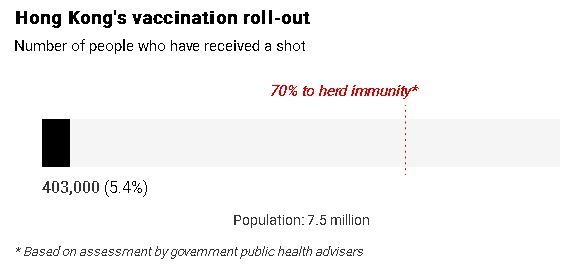About 25,000 people are receiving shots every day, but city can handle twice that number, Secretary for the Civil Service Patrick Nip tells the Post. Experts estimate Hong Kong may need about 300 more days to achieve herd immunity.
The top official overseeing Hong Kong’s coronavirus vaccination programme has cautioned that the number of people coming forward to receive the Covid-19 shots meets only half the daily capacity, and urged the city to pick up the pace if it wants to achieve herd immunity sooner and open up travel again.
Secretary for the Civil Service Patrick Nip Tak-kuen’s appeal for greater public participation came in a wide-ranging interview with the Post on Tuesday as his boss, Chief Executive Carrie Lam Cheng Yuet-ngor, said her administration was looking to open up the vaccination scheme to everyone aged 16 or older, depending on the supply of vaccines.
Health authorities confirmed 12 more infections on Tuesday, four of them locally transmitted and eight brought in by travellers from France, Pakistan, the Philippines and Indonesia.
“[Recently], we’ve had about 25,000 persons getting the first dose of vaccines a day. It’s not enough. We can handle 50,000 a day,” Nip told the Post.
Since the roll-out of the mass vaccination scheme in late February, 403,000 people have received their first dose, which accounts for 5.4 per cent of the 7.5 million population and 6.2 per cent of Hongkongers aged 16 or above.
Two types of vaccines, China’s Sinovac and the German-made BioNTech, are currently being administered at nearly 30 community vaccination centres, 18 general outpatient clinics and some 2,000 private clinics across the city.
Nip admitted that reports of people falling severely ill after receiving the Covid-19 shots, including eight with chronic underlying conditions who died after being vaccinated, were discouraging others from getting inoculated, even though experts had found no link between the deaths and the jabs.
“You don’t know at that time, immediately, about the causality assessment. Of course it would need some time, then it will cause some sort of anxiety or worries,” he said.
Given the current pace of vaccination, some experts have estimated that it may take Hong Kong about 300 more days before it achieves a state of herd immunity.
The government has already expanded the scheme initially covering 2.4 million people in priority groups, including those aged 60 or above and health care workers, to a total of 5.5 million eligible people aged at least 30 years.
Further opening up the scheme to anyone aged 16 years or more would qualify 6.5 million of the city’s 7.5 million residents for the Covid-19 shots.

While noting that it would be a “really challenging” task to vaccinate all 6.5 million over the next few months, Nip stuck to the government’s goal of inoculating the “majority” of the population by the end of the year.
“We’ve just started for a month. A lot of work needs to be done. At least for the first month, we had the whole vaccination programme rolled out in a gradual and orderly manner,” he said.
While both Nip and Lam have earlier suggested that the government was looking to open up the vaccination scheme to those in the 16-29 age bracket, the civil service chief would not venture a specific timetable.
Public health experts have estimated that Hong Kong would have to vaccinate about 70 per cent of the population – or more than 5 million people – to reach herd immunity. But Nip hinted that vaccinating 4 million people, accounting for about 62 per cent of those in the eligible groups to be expanded further, could meet the minimum mark for herd immunity – with the speed subject to various factors.
“If we are talking about 4 million, can we do it within six months? That means can we do it by the end of August? That’s the kind of situation we are thinking of,” Nip said.
“We need to look at supplies of vaccines, total capacity that our centres and clinics can handle, and also how proactive people would come forward and do the booking and get the jabs. These are all very interactive.”
On the politicisation of the vaccine programme, with many refusing to trust the Chinese-manufactured Sinovac, he said it did not really matter which vaccine people opted for as long as they were inoculated.
“The most straightforward thing is to look at the science, the figures and the facts, and not look at where the vaccines come from or the politics or the political considerations,” he said.
Nip also touched upon incentives to boost vaccination rates, floating possibilities such as relaxing social-distancing measures and allowing travel out of Hong Kong.
“There surely would be a difference for one who gets vaccinated and one who does not,” he said.
Earlier on Tuesday, the chief executive promised to negotiate with overseas governments on lifting border restrictions and bringing back international travel for residents vaccinated against Covid-19.
“If we can work out mutual-recognition arrangements with other places for visitors who have received two doses and have the immunity to travel, we will surely study and work towards a deal,” Lam said.
She added that she would look into some “mitigating factors” to reduce the 21-day compulsory quarantine for travellers who had stayed anywhere outside China before arriving in the city.















